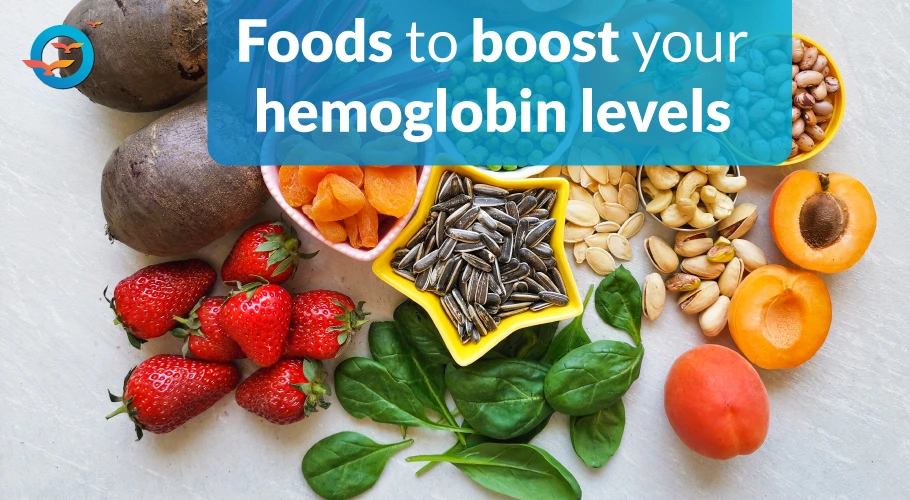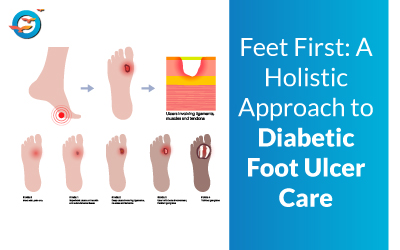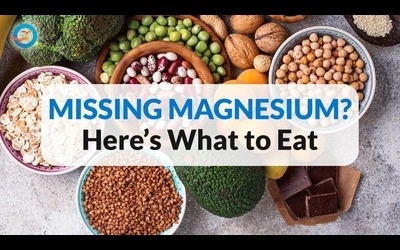Foods To Increase Hemoglobin

What is Hemoglobin (Hb)?
Hemoglobin is a protein in red blood cells that transports oxygen from the lungs to the rest of the body and returns carbon dioxide back to the lungs.
Each hemoglobin molecule can carry four oxygen molecules because of the iron it contains. This process is essential for keeping tissues and organs oxygenated and functioning properly.
Why is it important to have a normal amount of hemoglobin?
Maintaining optimum hemoglobin levels is crucial, as adequate hemoglobin levels ensure that tissues and organs receive the oxygen they need to function properly, supporting energy production and overall vitality.
Hemoglobin normal range: Men and Women
Hemoglobin levels can differ depending on age, gender, and overall health.
Here are the typical normal ranges:
- Men: 13.8 to 17.2 grams per deciliter (g/dL)
- Women: 12.1 to 15.1 grams per deciliter (g/dL)
Menstruation and Low Hemoglobin
Menstruation is a natural process where women have monthly bleeding as the uterine lining sheds. This blood loss can lower hemoglobin levels.
Different types of anemia:
Anemia is of different types namely;
- Hemolytic
- Sickle cell
- Thalassemia
- Aplastic
- Iron deficiency etc.
Today, we are going to discuss iron-deficiency anemia. Iron-Deficiency Anemia is a common type of anemia caused by insufficient iron levels in the body, which are necessary for producing hemoglobin.
When iron levels are too low, the body cannot produce enough healthy red blood cells, leading to symptoms such as fatigue, weakness, pale skin, and shortness of breath. Iron deficiency anemia can result from inadequate dietary intake of iron, chronic blood loss, or poor iron absorption.
The Recommended Dietary Allowance (RDA) for iron varies across different age groups and life stages. Adult men need 8 mg of iron daily, whereas adult women require 18 mg due to menstrual blood loss. Adolescents have higher requirements: boys need 11 mg per day, and girls need 15 mg to support their growth and development.
Pregnant women have the highest RDA at 27 mg per day to meet increased demands for fetal development and blood volume. Lactating women require 9-10 mg of iron daily to replenish stores and support milk production. These recommendations ensure that each group meets their iron needs for optimal health and function.
Foods to increase Hemoglobin
Certain foods are rich in iron and other nutrients essential for hemoglobin production. Incorporating these foods into your diet can help boost hemoglobin levels.
1. Iron-Rich Foods
- Legumes:
Lentils, chickpeas, beans, and peas provide non-heme iron.
- Leafy Greens:
Spinach, kale, and collard greens are high in non-heme iron.
- Nuts and Seeds:
Pumpkin seeds, sunflower seeds, and cashews are good sources of non-heme iron.
- Fortified Cereals and Grains:
Many cereals and whole grains are fortified with iron.
2. Vitamin C-Rich Foods
- Citrus Fruits:
Oranges, lemons, and grapefruits help enhance iron absorption.
- Berries:
Strawberries, raspberries, and blueberries are high in vitamin C.
- Bell Peppers:
Red, green, and yellow bell peppers are rich in vitamin C.
- Tomatoes and Broccoli:
Both are excellent sources of vitamin C.
3. Folate-Rich Foods
- Leafy Greens:
Spinach, kale, and romaine lettuce.
- Legumes:
Lentils, beans, and peas.
- Nuts and Seeds:
Sunflower seeds and peanuts.
- Fruits:
Bananas, oranges, and avocados.
4. Vitamin B12-Rich Foods
- Dairy Products:
Milk, cheese, and yogurt.
- Fortified Foods:
Some plant-based milks and breakfast cereals are fortified with B12.
Points to note-
- An adequate amount of protein is needed, as Hb is a complex of iron plus protein.
- The presence of Vitamin C increases iron absorption, so foods should be vitamin-rich.
Other foods to increase Hb which are vegan are garden cress seeds, pumpkin seeds, black raisins, apricots, figs, dates, beetroots, spinach, and other green leafy vegetables.
Increasing Hemoglobin Through Supplements
Adjusting your diet may not always be sufficient to boost hemoglobin levels. In some cases, supplementation might be required. However, it's crucial to seek advice from a medical professional before incorporating any new supplements into your routine.
1. Iron Supplements
- Available in various forms, including ferrous fumarate, ferrous gluconate, and ferrous sulfate.
- These supplements help increase iron levels and improve hemoglobin production.
2. Vitamin C Supplements
- Taking vitamin C supplements can enhance the absorption of non-heme iron from plant-based sources.
3. Folate Supplements
- Folate or folic acid supplements can be taken to address deficiencies that contribute to low hemoglobin levels.
4. Vitamin B12 Supplements
- Available as oral supplements, injections, or sublingual tablets for those with B12 deficiency.
Tips for Enhancing Hemoglobin Levels
1. Combine Iron-Rich Foods with Vitamin C:
This combination improves iron absorption. For example, pair spinach (iron) with bell peppers (vitamin C).
2. Avoid inhibitors:
Certain substances can inhibit iron absorption, such as tannins in tea and coffee, calcium in dairy products, and phytates in legumes and whole grains. Consume these in moderation and not alongside iron-rich meals.
3. Regular Monitoring:
If you have been diagnosed with low hemoglobin or anemia, regular blood tests are essential to monitor your levels and adjust your diet or supplements accordingly.
Do you want to know about Foods to boost your immunity, visit our blog.
Conclusion
Increasing hemoglobin levels through diet and supplements is a practical approach to managing and preventing anemia. By incorporating iron-rich foods, enhancing iron absorption with vitamin C, and considering necessary supplements, you can effectively boost your hemoglobin levels and improve your overall health.
At FFD, we identify any missing factors and provide guidance accordingly, while encouraging the consumption of vegan iron-rich foods and Vitamin C to boost absorption.
Take care of your hemoglobin it will take care of you!
FAQs
What is hemoglobin and what does it do?
Hemoglobin is a protein in red blood cells that carries oxygen from the lungs to the body and returns carbon dioxide back to the lungs.
What is the normal hemoglobin level for men and women?
Men: 13.8 to 17.2 g/dL
Women: 12.1 to 15.1 g/dL
What are the symptoms of low hemoglobin?
Fatigue, weakness, pale skin, dizziness, and shortness of breath.
How does iron affect hemoglobin levels?
Iron is essential for hemoglobin production. Without enough iron, red blood cells cannot carry oxygen efficiently.
What foods help increase hemoglobin naturally?
Iron-rich foods like lentils, spinach, nuts, seeds, and fortified cereals, along with vitamin C-rich foods like citrus fruits and bell peppers.
Why is vitamin C important for hemoglobin levels?
Vitamin C enhances the absorption of non-heme iron from plant-based foods, helping increase hemoglobin levels.
Can drinking tea or coffee lower hemoglobin levels?
Yes, tea and coffee contain tannins that can inhibit iron absorption. It’s best to avoid them with iron-rich meals.

